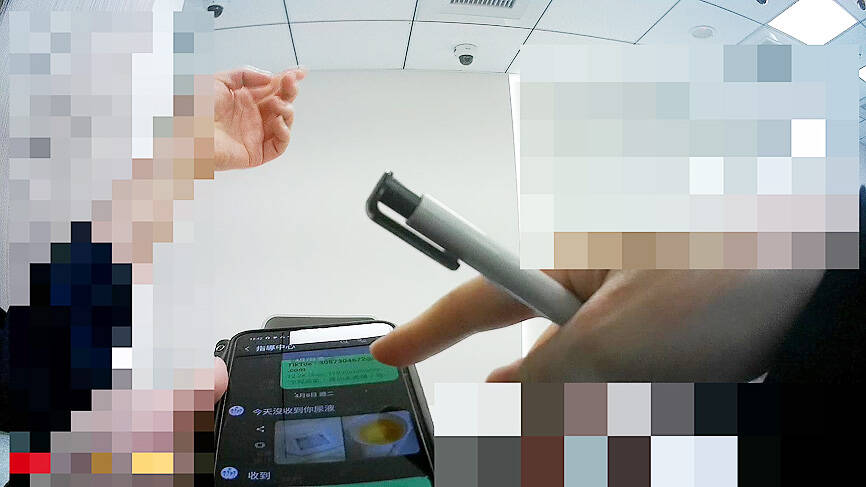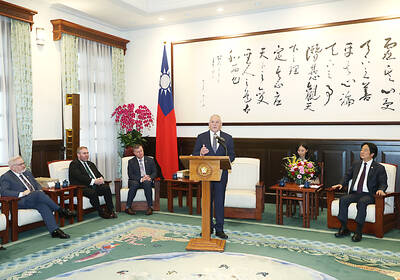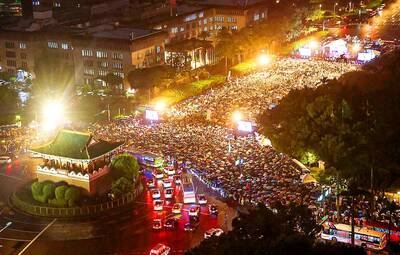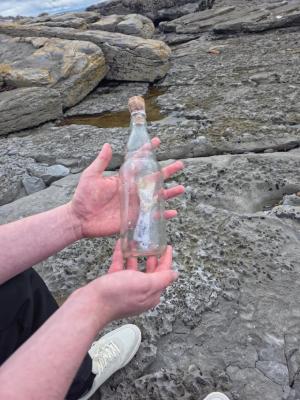Police in Taichung yesterday credited a bank teller with helping to stop a man from wiring NT$120,000 to a person claiming to be able to diagnose and treat health problems using photographs of a person’s urine.
The 70-year-old victim, surnamed Wang (王), was lured into the scam after seeing an online ad for health treatments to restore health and vitality, the Taichung Police Department’s Qingshui Precinct said.
After adding the company’s “guidance center” on Line, Wang was contacted by a man who identified himself as a “professor,” and allegedly offered to remotely diagnose his health issues using photos of his urine.

Photo: CNA
Once Wang had uploaded the photos, the professor asked for payment, after which he promised to send a medical ointment to be used for treatment, the police department said.
Wang on Tuesday last week went to a local bank branch to wire the money, and when asked about the purpose of the transfer, he said that he was buying medical products, police said.
Suspecting a possible scam, the bank teller checked the transaction history of the recipient account, and found that it had “abnormal cash flows.” The teller then called the police.
Upon arriving at the bank, police officers found Wang on the phone with someone from the “company” and asked to speak with him.
The man identified himself as the owner, surnamed Chen (陳), of a company that acted as a reseller of healthcare products, but when he was asked for the company’s tax number, he hung up, police said.
The police officers told Wang that it was a common scam, while the bank teller showed him that the registered name and address of the recipient account did not match the information the man had given them over the phone.
After much discussion, Wang eventually agreed not to go through with the payment, and the officers helped him block the company’s account on Line.
The police department urged members of the public to only seek medical treatment at accredited hospitals and clinics.

‘NON-RED’: Taiwan and Ireland should work together to foster a values-driven, democratic economic system, leveraging their complementary industries, Lai said President William Lai (賴清德) yesterday expressed hopes for closer ties between Taiwan and Ireland, and that both countries could collaborate to create a values-driven, democracy-centered economic system. He made the remarks while meeting with an Irish cross-party parliamentary delegation visiting Taiwan. The delegation, led by John McGuinness, deputy speaker of the Irish house of representatives, known as the Dail, includes Irish lawmakers Malcolm Byrne, Barry Ward, Ken O’Flynn and Teresa Costello. McGuinness, who chairs the Ireland-Taiwan Parliamentary Friendship Association, is a friend of Taiwan, and under his leadership, the association’s influence has grown over the past few years, Lai said. Ireland is

FINAL COUNTDOWN: About 50,000 attended a pro-recall rally yesterday, while the KMT and the TPP plan to rally against the recall votes today Democracy activists, together with arts and education representatives, yesterday organized a motorcade, while thousands gathered on Ketagalan Boulevard in Taipei in the evening in support of tomorrow’s recall votes. Recall votes for 24 Chinese Nationalist Party (KMT) lawmakers and suspended Hsinchu City mayor Ann Kao (高虹安) are to be held tomorrow, while recall votes for seven other KMT lawmakers are scheduled for Aug. 23. The afternoon motorcade was led by the Spring Breeze Culture and Arts Foundation, the Tyzen Hsiao Foundation and the Friends of Lee Teng-hui Association, and was joined by delegates from the Taiwan Statebuilding Party and the Taiwan Solidarity

An SOS message in a bottle has been found in Ireland that is believed to have come from the Taiwanese captain of fishing vessel Yong Yu Sing No. 18 (永裕興18號), who has been missing without a trace for over four years, along with nine Indonesian crew members. The vessel, registered to Suao (蘇澳), went missing near Hawaii on Dec. 30, 2020. The ship has since been recovered, but the 10 crew members have never been found. The captain, surnamed Lee (李), is believed to have signed the note with his name. A post appeared on Reddit on Tuesday after a man

A saleswoman, surnamed Chen (陳), earlier this month was handed an 18-month prison term for embezzling more than 2,000 pairs of shoes while working at a department store in Tainan. The Tainan District Court convicted Chen of embezzlement in a ruling on July 7, sentencing her to prison for illegally profiting NT$7.32 million (US$248,929) at the expense of her employer. Chen was also given the opportunity to reach a financial settlement, but she declined. Chen was responsible for the sales counter of Nike shoes at Tainan’s Shinkong Mitsukoshi Zhongshan branch, where she had been employed since October 2019. She had previously worked